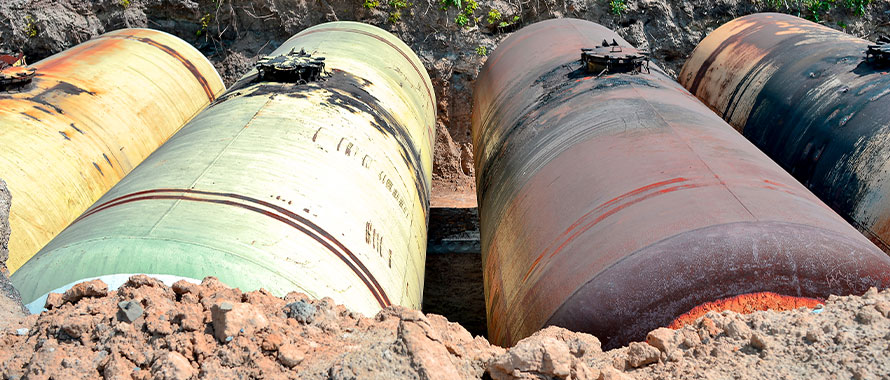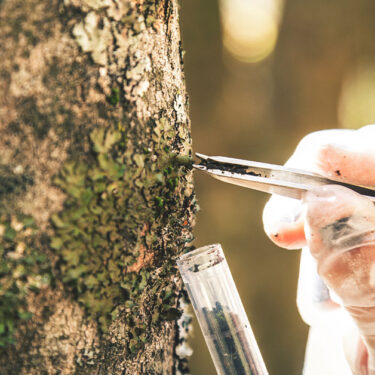Inside This Article:
- Cleanup crews responding to an underground storage tank leak in Woodstock, Ontario, have now recovered approximately 180,000 liters of diesel, exceeding earlier estimates.
- In addition to businesses that were impacted by the leak, area residents have expressed concerns about groundwater safety and potentially reduced property values.
- The disaster underscores the importance of Environmental Insurance policies such as Storage Tank Pollution Liability Insurance.
- Coverage of ‘gradual’ environmental impacts like this lead is generally not included in a standard Commercial General Liability (CGL) Insurance policy, which covers ‘sudden and accidental’ incidents
Six months after a massive diesel leak was detected at an Irving Oil gas station in Woodstock, Ontario, cleanup crews have now recovered more than 180,000 liters of fuel, according to reports. This extends previous estimates of 100,000 liters as of March and 174,000 liters just weeks later, pointing to a much larger spill than initially reported.
Check out our prior coverage: 100,000-Liter Fuel Leak Forces Restaurant Closures, Costly Cleanup
The recovery operation is ongoing and includes the use of vacuum trucks to extract contaminants and the installation of more than two dozen new wells that reports indicated would likely be used to monitor for underground contamination around the site.
“This release could impact the surrounding area and the people that live there for years,” said Beth Linton, Vice President, Environmental Brokerage, Burns & Wilcox, Atlanta, Georgia. “The financial costs and reputational damage from a spill such as this can often times be unrecoverable.”

This release could impact the surrounding area and the people that live there for years. The financial costs and reputation damage from a spill such as this can oftentimes be unrecoverable.
According to Karim Jaroudi, Manager, Environmental, Burns & Wilcox, Toronto, Ontario, the situation has escalated rapidly, and cleanup efforts are likely still not “anywhere near done,” he said.
Why specialized coverage is critical
“From an Environmental Insurance perspective, this speaks to two things: it goes directly to the heart of how hard it is to identify subsurface impacts — by the time you identify them, they are often significant in nature — and secondly, the value of coverage for ‘gradual’ conditions as opposed to ‘sudden and accidental’ conditions, which is usually the language of a Commercial General Liability (CGL) Insurance policy as pertains to potential pollution give-backs,” he said.

[The incident] goes directly to the heart of how hard it is to identify subsurface impacts — by the time you identify them, they are often significant in nature.
An oil company would need to carry specific Environmental Insurance policies, such as Storage Tank Pollution Liability Insurance – or the more enhanced Premises/Site Pollution Liability Insurance – to cover this type of gradual loss, with the policy potentially helping to pay for cleanup costs, environmental impacts, third-party bodily injuries and property damage, legal defense, and more. A standard CGL Insurance policy with a Pollution Enhancement would not usually cover remediation and would typically only respond to sudden, accidental losses.
“This spill highlights the importance of educating owners of storage tanks regarding the importance of Storage Tank Pollution Liability coverage,” said Linton. “The coverage is a vital tool for businesses to manage environmental risks, comply with regulations, and protect themselves from potentially devastating financial and legal consequences.”
“This is exactly the type of situation we warn our brokers and clients about — it is not fearmongering,” Jaroudi agreed. “It is one of the clearest real-world examples you could imagine of why this coverage matters.”

This is exactly the type of situation we warn our brokers and clients about — it is not fearmongering. It is one of the clearest real-world examples you could imagine of why this coverage matters.
Community health and property concerns mount
Based on government emails obtained by CBC, Irving Oil was not aware of discrepancies in their fuel numbers until after the spill was detected at the Woodstock gas station. By that time, residents had already reported signs of diesel in the water at a nearby Tim Hortons, where customers reportedly smelled fuel and tasted it in their beverages. One customer told news outlets that he complained to a manager about a gas smell from the bathroom faucets at the restaurant seven weeks prior to the business being shut down over the leak, CBC reported.
“Storage tank pollution liability coverage is crucial for businesses because it protects them from the potentially devastating financial and legal consequences of leaks, spills, or other incidents involving storage tanks,” said Linton.

Storage tank pollution liability coverage is crucial for businesses because it protects them from the potentially devastating financial and legal consequences of leaks, spills, or other incidents involving storage tanks.
As investigations into the leak continue, residents in the area have voiced concerns about health risks and financial impacts. One couple recently told CBC they are worried diesel could contaminate their water supply and diminish their property value. Diminution in Value (DIV) is another potentially helpful feature that might be available, usually under third-party property damage in Environmental Insurance policies, Jaroudi said.
“The human element is the first thing we worry about as underwriters,” he said. “That is just one part of the human cost of this ongoing tragedy. The entire situation is a living example of why Environmental Insurance coverage needs to be seriously considered.”






